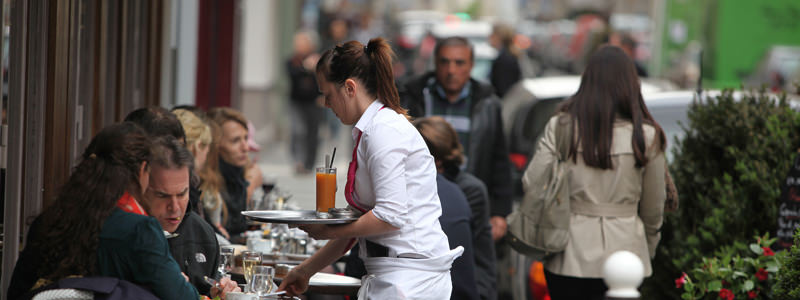If you haven’t seen this video by now, you will.
It’s the day after the attacks in Paris, and a father and son are talking to a reporter for Le Petit Journal. The son, understandably, believes “il fault changer maison”—we have to change houses, move out. His father goes on to assure him they don’t have to move. “France is our home.” Again, understandably, the little boy notes that the “bad guys” have guns, to which the father replies “they might have guns, but we have flowers.” Once more, the boy resists. “But flowers don’t do anything.” The father, very kindly, corrects him. “It’s to fight against guns.”
Out of context, that might seem like a sentimental or facile phrase, something innocuously peaceful but possibly too optimistic in the current state of the world. Except that phrase is specifically, doggedly appropriate for this state of the world. And this father and son, like so many Parisians and French citizens, have shown up. As Alexandre Cammas, founder of Le Fooding, told The New York Times, “What makes Paris has been attacked and hurt…It is very important that Paris gets up again, fast, and continues to be Paris.”
That ability—to show up—carries profound currency in this state of affairs. “We’re all worried here, even though we try to be brave,” Parisian resident Baptise Bonhomme told us. Five of his friends were at Le Carillon, the dive bar in the 10th Arrondissement that was attacked by a shooter in the second of Friday night’s string of attacks, including Le Petit Cambodge, an equally beloved, and fully innocuous, Cambodian neighborhood restaurant nearby. The attacks, as we know, went on. At least 129 people were killed, and hundreds more injured.
Bonhomme’s friends survived, but something in the idea of the social fabric was deeply ruptured, a wound rapidly if ineffectually cauterized by government warnings to stay inside and avoid congregating. Except congregating is part of the central spirit of Parisian culture. A ban on it wouldn’t last. “France has important values,” says Bonhomme. “One of them is ‘l’art de vivre,’” meaning knowing how to live—an art the French have perfected and, blessedly, passed along in part to the rest of us. “After the attacks, it was important to go back to the cafes and especially the terraces, because it’s a way to show the terrorists we are not afraid.”
Nor is Bonhomme alone. In fact, entirely the opposite. There is a rallying cry spreading in Paris, and all over the world: “Tous au bistrot!,” or “Everyone to the bar!” There are even Twitter hashtags running, #tousaubistrot and #jesuisenterrasse (meaning “I’m sitting outside”). Typically a call to the bar is made with some sense of drunken conviviality, or angry birthday-girl insistence. Here, it’s an act of vital defiance. Of course, the idea of going to a bar and taking a glass of wine among friends was never intended to be an act of aggressive cultural response. The pure mundane beauty of it is what makes it so Parisian—a ritual embedded in the culture of cultures, where relaxation is an art and wine is a common thread, the jovial fluidity of a peaceful life.
But in the modern context, which we’re all scrambling to define, the fact of a cool and calming hum, or the easy melody of ‘l’art de vivre,’ isn’t frivolity, it’s humanity. “Wine is central. Not because you see a bottle of wine on the tables of every café. But it’s a passion,” says Bonhomme. “A symbol and a simple pleasure of life. Wine is so intimately part of our civilization.”
Like giving flowers.
At the end of the video, the boy was finally comforted and understood. “The flowers and the candles are here to protect us.” Flowers may wilt, sure. But they grow. So do grape vines. Guns don’t.

